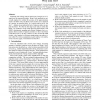Free Online Productivity Tools
i2Speak
i2Symbol
i2OCR
iTex2Img
iWeb2Print
iWeb2Shot
i2Type
iPdf2Split
iPdf2Merge
i2Bopomofo
i2Arabic
i2Style
i2Image
i2PDF
iLatex2Rtf
Sci2ools
112
click to vote
ICCAD
2008
IEEE
2008
IEEE
Practical, fast Monte Carlo statistical static timing analysis: why and how
Statistical static timing analysis (SSTA) has emerged as an essential tool for nanoscale designs. Monte Carlo methods are universally employed to validate the accuracy of the approximations made in all SSTA tools, but Monte Carlo itself is never employed as a strategy for practical SSTA. It is widely believed to be “too slow” – despite an uncomfortable lack of rigorous studies to support this belief. We offer the first large-scale study to refute this belief. We synthesize recent results from fast quasi-Monte Carlo (QMC) deterministic sampling and efficient Karhunen-Loéve expansion (KLE) models of spatial correlation to show that Monte Carlo SSTA need not be slow. Indeed, we show for the ISCAS89 circuits, a few hundred, well-chosen sample points can achieve errors within 5%, with no assumptions on gate models, wire models, or the core STA engine, with runtimes less than 90 s.
| Added | 16 Mar 2010 |
| Updated | 16 Mar 2010 |
| Type | Conference |
| Year | 2008 |
| Where | ICCAD |
| Authors | Amith Singhee, Sonia Singhal, Rob A. Rutenbar |
Comments (0)

